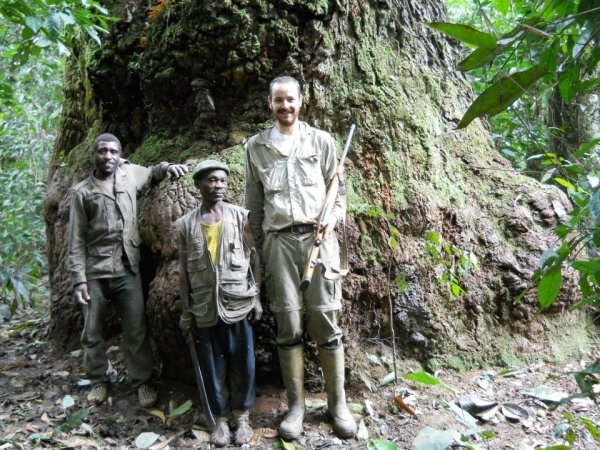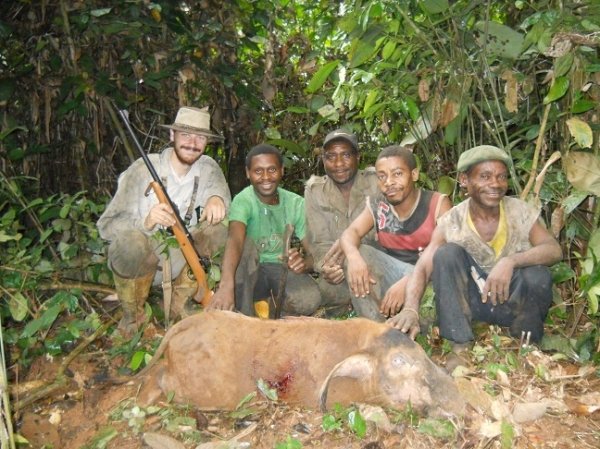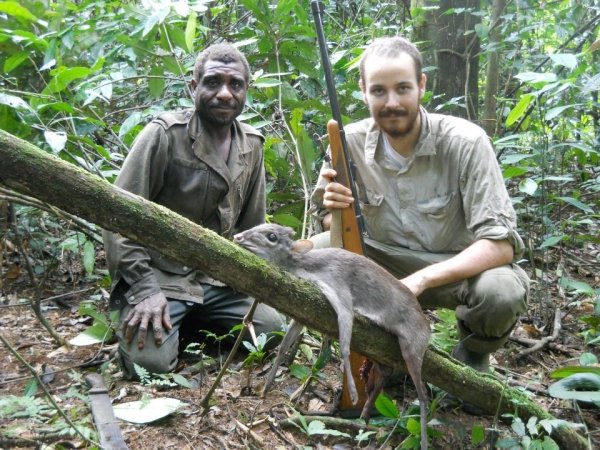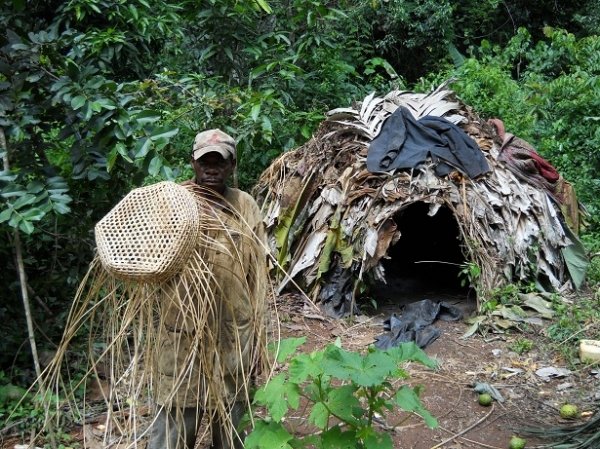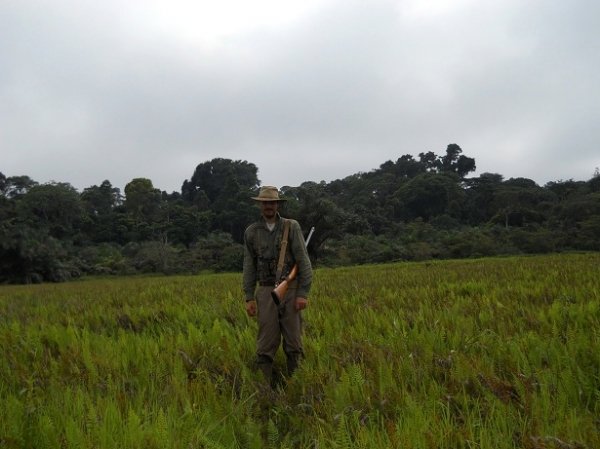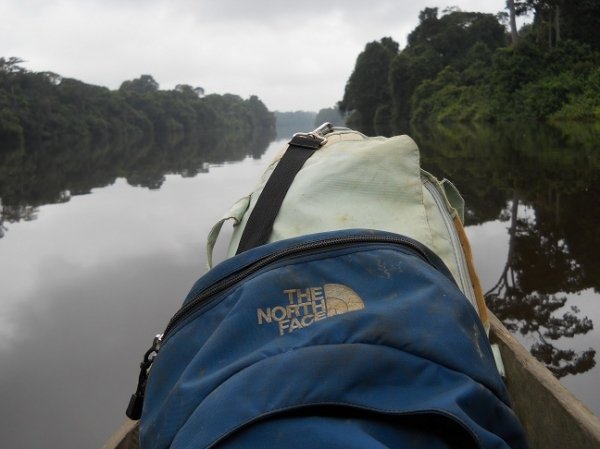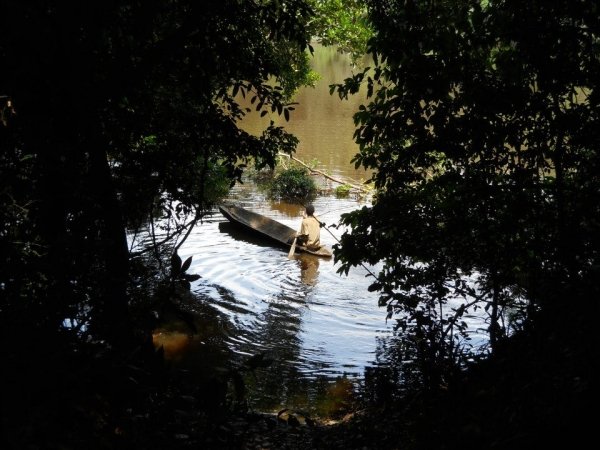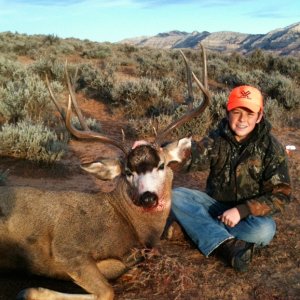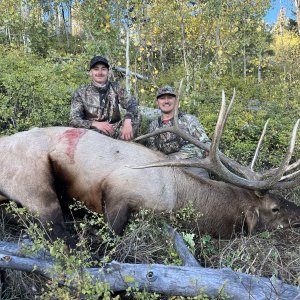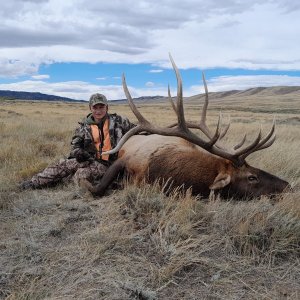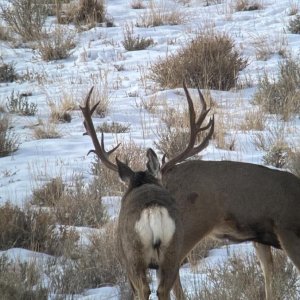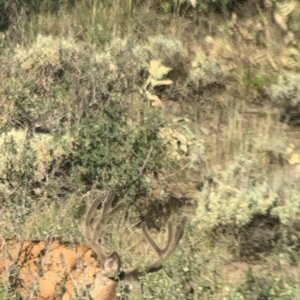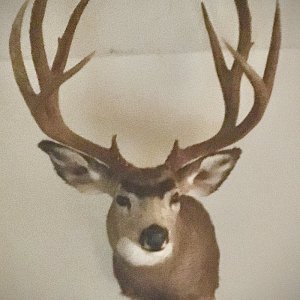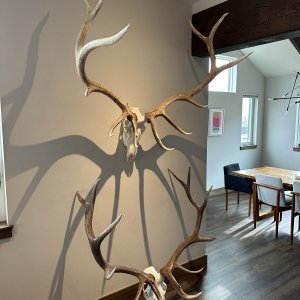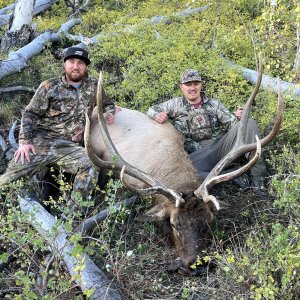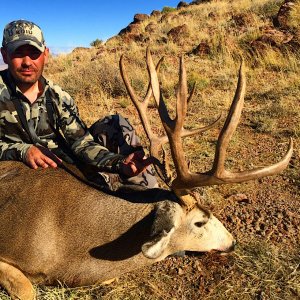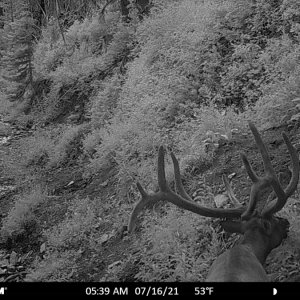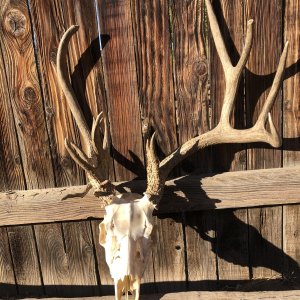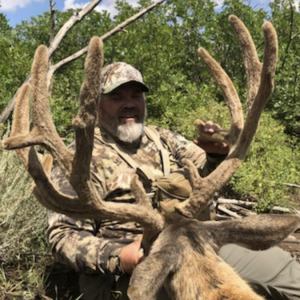W
WildernessHunter
Guest
Posted below is a long article pertaining to a recent hunting trip.
I've enjoyed keeping a personal hunting journal about some of my hunting adventures but now I'm entertaining the thought of trying to publish some. I've been a long time monstermuleys.com fan but never posted anything myself. I realize this is a longer post than most, and I hope this isn't taboo in any way. I'm wishing that some of you could take the time to read this journal entry and give me a little feedback. I figure I can get some blatant, straight forward critiques from other hunters this way before I consider talking to an editor. Thanks in advance for the input and hopefully during these slower winter months this will provide a good read on monstermuleys.com
Saturday, July 16.
I realized I'd subconsciously been easing air from my lungs as slowly and silently as possible. Simon had stopped hacking vines with the machete and was now carefully taking them in his hand and slicing them at an angle with a small knife to minimize the sound of our progression through the thick vegetation. All the vines above his four-foot frame were left intact; at six foot three, I felt as if I were trying to find my way through a giant spider web.
We had been on the bull?s tracks since early morning. The ground was dry, and tracking sometimes involved bending doubled over, searching for the thin half-moon outline where the bull had placed its heavy front foot in the dirt when it passed in the night. When the fallen leaves were too thick, Simon would feel, with his bare feet, for the huge circles of compressed soil hidden under the leaves. By mid afternoon, there still had been no physical indication we were closing in on the bull, but with a hunter?s instinct we knew we were close. Tension was mounting in the heavy, humid air. Another half an hour passed.
Then the sharp snap of a broken branch and the swishing sound of brush being pushed aside by the body of a large animal confirmed without a doubt our gut feeling. We were close to the elephant, maybe two hundred yards at most. We all froze in awkward positions: I was hunched over, bending under vines and bushes; some of the Baka Pygmy porters had stopped, balancing on one foot, shaking under the weight of their packs. We listened while time passed with only the buzzing noise of biting insects and the constant, howling chatter of monkeys high above, then again we heard a crash up ahead and to our left.
The bull wasn?t traveling but taking his restless afternoon nap. He was in stalking range, and we had hours to do it before he started walking and feeding again. Without a word or command we all slipped off our packs and sat down on them in the long strung-out line of ten men. Simon, my pisteur (or trailblazer), sat down with his back to me. He pulled out a dried leaf and a small bag of tobacco, rolled the leaf cigarette, then turned and motioned for my lighter. I wasn?t worried about the bull smelling the smoke?if the thick air was flowing toward the bull, he would have already fled from human scent. Simon took deep breaths on the tobacco and looked straight ahead to where we'd last heard the crash as if he were staring into the eyes of the elephant. He would be the only one to come with me for the stalk and he full well realized the risk.
I prepared by detaching the sling from my .458 Win mag., clipping the ends together and slipping it over my head and under one arm. If things went wrong I never wanted the firearm to get hung up on the brush by its sling. I stuck my hat on a branch and finally pushed a cigar-sized shell into the chamber. We were in no hurry.
It was good to rest after the tough tracking all morning while carrying packs. To keep calm, I tried not to think of the next hour of my life and the possible outcomes. So instead I wondered what Olivia was doing back in Utah as I sat in the heat and mud. I looked at my watch and counted back the hours; it would still be late Friday night for her. She was probably on a date with another guy, so I changed my thoughts and imitated Simon by looking toward the sound of the occasional crashing. I also noticed that half of Simon?s leaf had already been smoked. I knew with the last drag he would stand and we would start the stalk. Within a minute he threw the stub on the ground. I whispered, ?Ngo???let's go? in Baka.
Simon smiled and nodded. He slipped off his shirt and pants to reveal his short, blue, silky athletic shorts. My smile almost turned into a laugh. Back home I knew hunters who wouldn't hunt a muley without fifteen hundred dollars of camouflaged, scent-proof clothing. They?d shoot the deer at two hundred yards from a neighboring ridge then swear by their gear, believing it was their clothes that allowed them to get into position for the shot. Simon would get ten feet from a deadly heavy-tusker, through noisy brush, in only a pair of small, tight, blue shorts. I swore to myself never to forget this scene.
We rose and moved toward the sound. We left the line of porters, still silently sitting on their packs; they weren't watching us leave but were looking around for the nearest trees to climb. Within a hundred yards, Simon quickly stopped and jerked his head so his right ear was pointed toward the elephant. He then looked at me and motioned by slowly flapping his arms at his side that he could hear the bull breathing deeply. In ten minutes we were close enough I could hear the breathing too, with the occasional slap of a gigantic ear. But the forest was too thick to see any farther ahead than the barrel of my gun.
I heard the deep breathing constantly. Things were going to be put into motion quickly and I began to breathe fast and heavy. I again rehearsed the shot placements to myself. A broadside shot was easy, but a frontal brain shot had me worried, I was only twenty-three and had never shot elephant. I had no idea if I would be able to judge the angle when it mattered most. I remembered the advice I'd read about aiming at an imaginary stick between the ears. No matter how the head is positioned, the imaginary stick keeps your aim at the center of the brain.
I lifted my boot in slow motion to strategically place my next step, my leg shaking slightly. It was good to be nervous?it kept me careful?but I had to control the physical side effects. I tried to be dead inside and not think of my current position. It worked, at least a little.
Again Simon quickly stopped, but this time he squatted down. The bushes immediately in front of us swayed violently. In two steps I was kneeling in front of my pisteur, resting the big gun against a tree. I sighted through my rear peep sight, but there was nothing to see. The bull was feet from us, but I could only aim at the wall of forest. Then movement again and I saw a shadow in the brush, a ghost of an elephant. I had no idea what I saw; there was no outline, no definition, just a dark backdrop behind the green leaves. I trained my sight on a level where I thought his head would be and waited.
Simon rested his quivering hand on my shoulder and whispered on his exhaling breath, ?Shoot him, boss, he's huge! Oh he's huge. Shoot him now!?
?I can't see his head,? I breathed back.
?Can?t see his head? He?s looking right at us. Oh, he's huge.?
?I can't take a shot.?
?Kill him or he's going to kill us! He?s huge!?
I responded by lifting my hand straight up off the barrel in the halt position. Simon quit coaching me but whispered on every breath, "he's huge."
I kept the gun to my shoulder but moved my head all around the stock trying to see anything?an outline, a shoulder, a leg, a moving ear, anything. But to no avail. Without looking down I knew from the absence of their weight that I had forgotten my binoculars back in my pack. How I wished I had them now. I began to become anxious and my heart rate soared. There was nothing to do but wait and pray.
Then, in an opening the size of a dinner plate, I saw him. I immediately realized I was looking at ivory where it entered his cheek. I had no idea how long it was, but the ivory was thick, almost the size of my thigh, and even in the dim light I could see that it was stained the famous pink-rose color of forest elephant. But now with this glimpse as a reference point, I realized with heart-stopping surprise that I had been aiming a good three feet too low. This was a huge animal and here I was on bended knee at his feet. I felt like some peasant kneeling to a king, or a mere human bowing before a god.
I leaned back and swung the gun upward. All I needed was another small opening in the foliage and the shot was mine. I pushed the safety off, and it sounded like I'd just opened a can of Coke in a church service. The brush again exploded in movement. I could tell from the swaying forest he had turned and was moving ninety degrees to my right. I didn't hesitate and with my rifle still to my shoulder I paralleled him, not looking where I was headed but watching the moving foliage; then the green mass of leaves started to thin and I slammed on my brakes.
The bull exploded out of the brush into a small opening. Simon had been right: his tusks were long, maybe five feet from the cheek; they swept upward as he held his head high. I put the front sight on his ear, but faster than I could pull the trigger his head disappeared back into green leaves and vines. I swung lower for his shoulder, and just as I started applying pressure to the trigger, something inside me screamed a warning, ?gut shot.? Before I could think, he completely disappeared. There was no use following. At his walk he could outdistance my run. I stopped and put one foot up on a fallen log so I could rest my rifle on my knee. I clicked the safety on; it was barely audible now.
Simon came up behind me, wide eyed and shaking his head. He too had seen the bull for the split second as it crossed the opening. He again stammered, ?#####, he was huge!? but now in a loud voice.
I slowly shook my head. ?Yes, he was huge. I'm glad he didn't charge like the cow last week,? I said with relief.
I sat down and tried to process the last hour, but I was too drained to think, so I looked up at the monkeys staring down and squawking from high up in the canopy. They made me feel as if they were spectators and I was in a gladiator arena?they were expecting a show, but I didn't give them their money?s worth.
I didn't regret what had happened. I had done everything in my power to get a shot and nothing presented itself. There was the one split second when the bull ran through the opening, but it was risky at best, and without a backup gun, I wouldn't take anything but a sure shot. Trailing a wounded bull in this forest would be too much for me to handle by myself.
Later that night in camp, I sat in my tent and pictured the huge tusker in the clearing. I could see him as clearly in my mind as I had actually seen him earlier that day. Even with this vivid mental picture, it had happened so quickly that I wondered if the bull was really as big as I had seen, if his ivory had really been that beautifully colored. I could still picture the tusker so clearly with my eyes closed that I began to wonder if he had been real at all.
As I fell asleep to the buzz of insects in a dark forest and the mumbling of porters around the fire, l decided that even though I didn't pull the trigger, or watch the bull tip over at a brain shot, the bull of today would forever be my bull. I also concluded that like the elephant, one day this whole trip would probably seem like a dream.
Sunday, July 17.
I awoke in the gray of dawn. It had rained during the night and I could smell and feel the added moisture in the air as I breathed. My back ached from the cot, and I was cold. I thought about sleeping for a few more hours, but I hadn't dreamed about a solo, self-guided safari for years to sleep through it. I crawled out of my tent, shook the moths from my moist clothes, and quickly dressed.
The Baka were up and already pushing the dugout canoe into the river. I arranged my day pack then took my place, sitting cross-legged at the front of the canoe.
Mist still hung above the water, and the trees were a blurry gray on either shore of the huge river. I turned around and rested the small of my back against the bow of the dugout then closed my eyes, in a half sleep. The morning canoe-rides downriver were my favorite time of day.
A high, drawn-out whistle came from the shore.
?What monkey made that call?? Simon asked me as he paddled the canoe.
?A small monkey,? I answered, without opening my eyes.
Simon laughed in disappointment and shame. For weeks he had tried to teach me the Baka names for different birds and primates from identifying their calls and whistles as we floated down the Dja. But I was a hopeless student. I only learned enough to be able to tell the difference between a bird call and a primate howl. Individual species were way over my head.
A couple hours later, just as the day was beginning to become hot, we pulled the canoe to the shore, unloaded, then waved good-bye to our Bulu rower. The plan was the same as every day: we would circle back towards camp unless we crossed a fresh elephant tack, and then a long stalk would ensue until dark.
The day dragged on, with monotonous walking and grueling wading through swamps. We never found fresh spoor, and I was exhausted when we finally made it back to camp for dinner of rice and a seasoning cube. I needed a change and a different method of hunting. The old 1960s French map read that there was a village a few days ahead. I would return the canoes, lay off my present crew for fresh porters, and head deeper on foot into the jungle.
Thursday, August 4.
The Baka were crouched around their pinwheel fire. Rarely did flames lick the air from the charred wood. It was the deep red coals that lit up their faces as they solemnly smoked hand-rolled cigarettes.
I sat by myself close to my tent, mindlessly reading Green Hills of Africa by headlamp. I'd read the story three times so far on safari?it was the only book I'd brought. My dad had counseled me to bring more; I should have listened to him, but in a way I was glad to spend so much time on safari with Hemingway. It was a welcoming relief every night to listen in on discussions between Ernest and Pop, or to hunt the open savannas of the East instead of the jungles in Central Africa. It seemed like to him the two most important things on safari were the social company and alcohol. Two things I lacked. I enjoyed the company of my local crew, but I was reminded of the barrier between us as I tried to listen in on their conversation but understood nothing.
I could tell from the tone of their voices around the campfire that the Baka were having a serious conversation. Ambassador, my new pisteur, rose and retrieved a small plastic bag of salt I had given him. He returned to the fire with the bag and sat down. The other men fell quiet as Ambassador started a low musical chant. I stood up and quietly made my way to their fire to watch the ceremony. In between intervals of chanting he would toss a pinch of salt into the embers, and the fire in turn would crackle and flare up for a split second before returning to a bed of coals.
?This must be something serious,? I thought. Bakas cherish salt and for them to throw it in a fire was out of character.
The simple ceremony didn't last long. Ambassador let his voice trail off to a whisper and dumped the remaining salt from his hand back into the plastic bag then tied it shut. The other men grunted or nodded in approval, and soon they were back to conversing in their strange tongue. I made eye contact with Ambassador and asked in French, ?Was that so Jengi [the spirit of the forest] would bring rain??
?Yes, we won't kill an elephant if it doesn't rain soon,? he said.
?That's true. Thanks for asking Jengi for help. I'm sure it will rain now.? The Baka Pygmies? lives revolved around sorcery and superstitions. Every event is caused by an unseen force, and for me not to agree with their beliefs could taint the morale of the whole crew.
Ambassador nodded at my approval, then returned his attention to the conversation with his fellow tribesmen. I walked to my tent, satisfied to know that this crew was as involved and determined to kill an elephant as I was.
Rain was essential to forest-elephant hunting. I'd read that rain and cooler temperatures drove the elephants from their thickets to open areas to warm in the sun, but except for the legendary savanna we'd spent a week hiking to; only to find it full of buffalo and completely absent of elephant spoor, the hundreds of miles of forest I'd crossed had been the same density. We needed rain desperately since it was useless trying to identify fresh tracks on the relativity dry ground, and even in the rainy season there hadn't been a storm in fifteen days. When an elephant did cross a palm swamp or step in mud, the track could stay in the exact same condition for days. The mud never dried and the footprint remained crisp. Because rain ruined older tracks, it gave me a better time reference on tracks I did find. I'd learned this lesson a difficult and tiring way, back in June, more than a month earlier.
We?d come across a huge elephant footprint early one morning and quickly followed. Leaves and branches on both sides of the bull?s trail were dripping in mud. It was clear that the large bull had just taken a bath and was only minutes in front of us. Soon my face, neck, and shoulders were covered in the bull?s mud from brushing against the same plants. I put a bullet in the chamber and kept my finger on the safety; all of our senses were on high alert, knowing we would stumble into the bull at any moment. We followed the gigantic footprints until evening, astonished we hadn't overtaken the animal. Finally I called off the chase and we headed back to camp disappointed.
Well into the night, we came to the spot where we'd initially picked up the trail fourteen hours earlier. Mud was still dripping off the same leaves and smeared onto my clothing as I walked on the narrow path. It was if the bull had just passed moments before.
Friday, August 5.
I'd heard the roll of thunder during the night, but the storm stayed miles from us. The Bakas? Jengi didn't send rain as asked, but we'd still hunt without him. We left camp the next morning in the cool dampness of dawn, well before the insects began to swarm. Ambassador with his machete took his place as pisteur, followed by me, still asleep with the gun and compass, then Ngala in the rear, carrying my personal backpack full of survival gear, water bottles, and secret money stash. The others rested under their canopy.
?Don?t eat any of the food,? I warned them. I then assigned chores to do around camp but never had the slightest expectation they'd be carried out.
The morning warmed, and as always we remained hidden in a stale, dull light, a light which never cast shadows or warmed the back of my neck. It was impossible for me to know which direction it came from. This unique and incomprehensible phenomenon gave the forest an unearthly feeling and sometimes made me very uneasy, knowing I would be lost if something happened to my compasses or GPS. As a game, I would ask the Bakas where the sun was. They?d slowly turn their bodies while staring into the branches above and then point in a specific direction. I would consult the compass for an answer; the seasoned Baka hunters were never right. Even when we found a break in the trees, the sky was a permanent flat gray color, with no definition from clouds or blue sky. The sky had no depth to it. It looked as if a gray ceiling were resting on the tops of the trees. I never once saw the stars or moon.
We wandered down elephant trails in search of fresh tracks, but by noon and after miles of trails we hadn't found anything that we thought was newer than twenty-four hours. Disheartened, I sat down on the exposed root of a tree so that Ambassador and Ngala could enjoy a smoke break.
?We need meat soon,? Ambassador said.
I translated his sentence into a warning that they were fast becoming dispirited with the hunt and would stop putting effort into our goal. I'd seen this before with previous crews and it could easily ruin the hunt.
?If we return to camp now, we'll get there around four this afternoon. This would give me two hours of daylight to hunt duiker. What do you think of that idea?? I asked.
Ambassador remained quiet in thought for a few minutes, but I could tell by the expression on his face that he was satisfied.
?We would like that very much if you killed a small animal for us to eat.?
Historically I'd declined to shoot any animal we'd seen in this part of the forest, so as to not scare elephants that could be in the vicinity. In my planning for the safari, I had decided I didn't want to worry about two rifles, so I'd only brought one rifle, a .458 Win mag. I reasoned that my main goal was to shoot an elephant and if I had time after, I would hunt other large game such as a Bongo, Sitatunga, or buffalo. But now I realized my inexperience had severely handicapped the overall hunting experience of the safari. I should have brought a lighter rifle or shotgun to shoot the plentiful small game, something that didn't have the noise of the large-bore gun. Elephants had turned out to be a more formidable prey than I had speculated, and now I'd been forced to pass on Giant Forest Hog, Bongo, Sitatunga, and numerous duikers in the past two weeks.
After a short break, we headed back on the same path we'd made. Even though it would have been faster to cut a new direct trail back to camp, Bakas refuse to return a different way than they had come?they don't like change, and they navigate their forest like one would a cave. With luck and no breaks we still made it to camp with a couple of hours to hunt duiker.
?Who can call duikers the best?? I asked the whole crew in general, using French and hand gestures. Without hesitation they all pointed to Ngala.
?But he has been hiking all day. Why don't one of you who've been resting come and call for me?? I asked.
?No.? Ambassador stated. ?Ngala is the best, and we need meat. He will go with you and call for duikers.?
I looked to Ngala and asked if he had the energy to hike for a few more hours. He hardly speaks a word of French so he looked questioningly to Ambassador for guidance. Ambassador sternly spoke to him in Baka. Ngala picked up my pack he'd just taken off, replaced it on his sweat-soaked back, and followed me into the forest.
I was tired and hoped from the numerous tracks we would be able to call a duiker to us within ten minutes of camp, but Ngala was overly meticulous about his calling setup. We would stop and crouch down in the thick undergrowth, and by drawing an invisible trail with his fingers in the air, Ngala would study the possible routes a duiker could take as it came to our calls. After a few moments of observing the plant growth, he would shake his head, stand, and move on further away, where he would analyze another possible ambush spot. Every place we stopped looked as good as any other place I had shot duikers earlier on the safari, and I was frustrated with Ngala?s critical hunting style. But I respected his work ethic and kept my mouth shut. I would wait until he chose a place to his liking.
Over an hour had passed and still we hadn't called once, even though everywhere I looked there were miniature hoof prints. Finally, we stumbled into a small area where a group of gorillas had made leaf beds. Ngala sat down on one of the circular beds and motioned me with his hand to sit too. Finally we would do some hunting.
Ngala covered his nostrils with two fingers and started to make a high pitch whining noise, which sounded like it could call in coyotes, not small antelope. I quickly loaded a solid shell and cursed myself for not bringing a smaller caliber rifle. Within a minute I heard a soft rustling of leaves over the sound of Ngala?s noise. I raised the big gun just in time to see a Red-Flank Duiker streak past, only inches in front of my feet. No time for a shot.
I looked at Ngala, who smiled and shook his head without stopping his call. Seconds later another duiker came running through the undergrowth; this one stopped at fifteen feet and peered towards Ngala. I could only see the duiker?s head so I guessed where its shoulder would be and touched the trigger. Over the recoil of the gun I saw the little antelope leap in the air, spin around, and dart down a trail. We both laughed and followed the trail the duiker had taken. It was clear I had missed him, but we wanted to double check. After making certain I'd missed, I ejected the brass and handed it to Ngala. He thought it was a great souvenir, and I noticed he turned it over and over in his hand as we headed for a new ambush site.
Ngala must have been excited for me to shoot again because within minutes he sat down and motioned he would call. I thought we were too close to where I had just shot, but I was enjoying this style of hunting too much to really care.
Ngala started his horrible noises again while I strained my eyes to see any type of movement. Again, an antelope broke from the brush and ran between Ngala and me. We both took time to laugh.
I thought to myself, ?This would be a bow hunter?s paradise.? I had yet to see an animal more than thirty yards away.
Ngala rested his lungs then called again. A small Peter?s Duiker came and stood facing us. Ngala slowly pointed at the animal with his free hand, but I had already seen it. I knew I only had a split second before the animal would bolt, I rushed the shot and the animal disappeared.
?I missed again!? I said in disbelief.
?We go find another,? Ngala said in broken French.
I stood and walked to the spot I thought the animal had been standing. No blood. We both made a semi-circle and found nothing.
?I need a drink,? I told Ngala.
I sat and rested against a tree, and soon I'd totally forgotten about missing two duikers in a row and was imagining how good fast food and a bath would be when I went home. I closed my eyes and rested. I had been moving since dawn and it felt good to relax.
A hidden bird high above my head let out a series of chirps which sounded identical to a cow elk, and I was no longer sitting in the murky green jungle but on another continent, chasing bugling bull elk on a brisk fall morning, up and down steep canyons choked with dark pines and groves of vibrant, yellow quakies which made for a perfect color contrast. I was no longer wading through swamps and palm thickets but crossing open meadows and clear streams. My camp consisted of illuminated wall tents in the dark, not a damp backpacking tent, and my hunting companions were my dad and grandpa, not a book. A forest-elephant hunt is no elk hunt.
When I left my thoughts and opened my eyes, Ngala was laying sprawled out on his back, smoking lazily and brushing biting insects off his shirt while lost in his own thoughts. I enjoyed hunting with him. He carried a heavier pack than any other porter and always volunteered to come out on the daily hunts. He was quiet, and I never heard him say more than a few sentences with the other Pygmies as they sat around the fire at night. When he speared a porcupine weeks earlier, his unique and genuine laugh had made me laugh too.
I stood and left my gear leaning against the tree. For some reason, I casually walked in another wider circle behind where the duiker had been standing. Ngala turned his head to watch me disappear into the trees but didn't move.
Almost fifty yards from where I'd shot, I discovered a leaf with one spot of bright scarlet blood on it. I immediately whistled for Ngala who came running with my gun and pack. I held up the leaf by its stem and twirled it in my fingers. We both laughed uncontrollably, I think more from exhaustion than from knowing I had hit the animal. I couldn't believe I had wounded a 20-pound animal with a .458. I thought I would either kill it instantly or miss cleanly.
Ngala took his machete and cut down the nearest small sapling to mark the spot where the blood was found. We then started searching for another drop. Ngala crouched down and traced imaginary lines in the air with his finger, trying to decide the probable direction the animal went. I took the American approach and aimlessly crashed off in all directions, scouring the ground. I found blood again, broke the nearest sapling, whistled for Ngala, and continued on. Ngala caught up to me, and we took turns finding and losing the trail. Ngala would lift up the underside of leaves to see where the duiker had brushed against them or kneel on all fours to determine where the trail went next. His tracking skills where incredible, but I was determined to keep the trail too. A lot of time passed, but we didn't realize it; we both were completely absorbed in finding the next drop of blood. Countless times, we would have to return to the last drop and start off in a new direction. I would think it was hopeless, then one of us would again find blood smeared on the stem of a plant or blotched on a fallen log, renewing our desire to continue the hunt.
Just as the evening light began to fade, we stumbled on the Peter?s duiker already dead. I had raked his left side with the bullet. Ngala and I both laughed again and shook hands. Ngala cut a vine and tied the animal?s back and front legs together, then slung it over his shoulder like a woman?s purse. I laughed again. The next morning we could continue with elephants.
I've enjoyed keeping a personal hunting journal about some of my hunting adventures but now I'm entertaining the thought of trying to publish some. I've been a long time monstermuleys.com fan but never posted anything myself. I realize this is a longer post than most, and I hope this isn't taboo in any way. I'm wishing that some of you could take the time to read this journal entry and give me a little feedback. I figure I can get some blatant, straight forward critiques from other hunters this way before I consider talking to an editor. Thanks in advance for the input and hopefully during these slower winter months this will provide a good read on monstermuleys.com
Saturday, July 16.
I realized I'd subconsciously been easing air from my lungs as slowly and silently as possible. Simon had stopped hacking vines with the machete and was now carefully taking them in his hand and slicing them at an angle with a small knife to minimize the sound of our progression through the thick vegetation. All the vines above his four-foot frame were left intact; at six foot three, I felt as if I were trying to find my way through a giant spider web.
We had been on the bull?s tracks since early morning. The ground was dry, and tracking sometimes involved bending doubled over, searching for the thin half-moon outline where the bull had placed its heavy front foot in the dirt when it passed in the night. When the fallen leaves were too thick, Simon would feel, with his bare feet, for the huge circles of compressed soil hidden under the leaves. By mid afternoon, there still had been no physical indication we were closing in on the bull, but with a hunter?s instinct we knew we were close. Tension was mounting in the heavy, humid air. Another half an hour passed.
Then the sharp snap of a broken branch and the swishing sound of brush being pushed aside by the body of a large animal confirmed without a doubt our gut feeling. We were close to the elephant, maybe two hundred yards at most. We all froze in awkward positions: I was hunched over, bending under vines and bushes; some of the Baka Pygmy porters had stopped, balancing on one foot, shaking under the weight of their packs. We listened while time passed with only the buzzing noise of biting insects and the constant, howling chatter of monkeys high above, then again we heard a crash up ahead and to our left.
The bull wasn?t traveling but taking his restless afternoon nap. He was in stalking range, and we had hours to do it before he started walking and feeding again. Without a word or command we all slipped off our packs and sat down on them in the long strung-out line of ten men. Simon, my pisteur (or trailblazer), sat down with his back to me. He pulled out a dried leaf and a small bag of tobacco, rolled the leaf cigarette, then turned and motioned for my lighter. I wasn?t worried about the bull smelling the smoke?if the thick air was flowing toward the bull, he would have already fled from human scent. Simon took deep breaths on the tobacco and looked straight ahead to where we'd last heard the crash as if he were staring into the eyes of the elephant. He would be the only one to come with me for the stalk and he full well realized the risk.
I prepared by detaching the sling from my .458 Win mag., clipping the ends together and slipping it over my head and under one arm. If things went wrong I never wanted the firearm to get hung up on the brush by its sling. I stuck my hat on a branch and finally pushed a cigar-sized shell into the chamber. We were in no hurry.
It was good to rest after the tough tracking all morning while carrying packs. To keep calm, I tried not to think of the next hour of my life and the possible outcomes. So instead I wondered what Olivia was doing back in Utah as I sat in the heat and mud. I looked at my watch and counted back the hours; it would still be late Friday night for her. She was probably on a date with another guy, so I changed my thoughts and imitated Simon by looking toward the sound of the occasional crashing. I also noticed that half of Simon?s leaf had already been smoked. I knew with the last drag he would stand and we would start the stalk. Within a minute he threw the stub on the ground. I whispered, ?Ngo???let's go? in Baka.
Simon smiled and nodded. He slipped off his shirt and pants to reveal his short, blue, silky athletic shorts. My smile almost turned into a laugh. Back home I knew hunters who wouldn't hunt a muley without fifteen hundred dollars of camouflaged, scent-proof clothing. They?d shoot the deer at two hundred yards from a neighboring ridge then swear by their gear, believing it was their clothes that allowed them to get into position for the shot. Simon would get ten feet from a deadly heavy-tusker, through noisy brush, in only a pair of small, tight, blue shorts. I swore to myself never to forget this scene.
We rose and moved toward the sound. We left the line of porters, still silently sitting on their packs; they weren't watching us leave but were looking around for the nearest trees to climb. Within a hundred yards, Simon quickly stopped and jerked his head so his right ear was pointed toward the elephant. He then looked at me and motioned by slowly flapping his arms at his side that he could hear the bull breathing deeply. In ten minutes we were close enough I could hear the breathing too, with the occasional slap of a gigantic ear. But the forest was too thick to see any farther ahead than the barrel of my gun.
I heard the deep breathing constantly. Things were going to be put into motion quickly and I began to breathe fast and heavy. I again rehearsed the shot placements to myself. A broadside shot was easy, but a frontal brain shot had me worried, I was only twenty-three and had never shot elephant. I had no idea if I would be able to judge the angle when it mattered most. I remembered the advice I'd read about aiming at an imaginary stick between the ears. No matter how the head is positioned, the imaginary stick keeps your aim at the center of the brain.
I lifted my boot in slow motion to strategically place my next step, my leg shaking slightly. It was good to be nervous?it kept me careful?but I had to control the physical side effects. I tried to be dead inside and not think of my current position. It worked, at least a little.
Again Simon quickly stopped, but this time he squatted down. The bushes immediately in front of us swayed violently. In two steps I was kneeling in front of my pisteur, resting the big gun against a tree. I sighted through my rear peep sight, but there was nothing to see. The bull was feet from us, but I could only aim at the wall of forest. Then movement again and I saw a shadow in the brush, a ghost of an elephant. I had no idea what I saw; there was no outline, no definition, just a dark backdrop behind the green leaves. I trained my sight on a level where I thought his head would be and waited.
Simon rested his quivering hand on my shoulder and whispered on his exhaling breath, ?Shoot him, boss, he's huge! Oh he's huge. Shoot him now!?
?I can't see his head,? I breathed back.
?Can?t see his head? He?s looking right at us. Oh, he's huge.?
?I can't take a shot.?
?Kill him or he's going to kill us! He?s huge!?
I responded by lifting my hand straight up off the barrel in the halt position. Simon quit coaching me but whispered on every breath, "he's huge."
I kept the gun to my shoulder but moved my head all around the stock trying to see anything?an outline, a shoulder, a leg, a moving ear, anything. But to no avail. Without looking down I knew from the absence of their weight that I had forgotten my binoculars back in my pack. How I wished I had them now. I began to become anxious and my heart rate soared. There was nothing to do but wait and pray.
Then, in an opening the size of a dinner plate, I saw him. I immediately realized I was looking at ivory where it entered his cheek. I had no idea how long it was, but the ivory was thick, almost the size of my thigh, and even in the dim light I could see that it was stained the famous pink-rose color of forest elephant. But now with this glimpse as a reference point, I realized with heart-stopping surprise that I had been aiming a good three feet too low. This was a huge animal and here I was on bended knee at his feet. I felt like some peasant kneeling to a king, or a mere human bowing before a god.
I leaned back and swung the gun upward. All I needed was another small opening in the foliage and the shot was mine. I pushed the safety off, and it sounded like I'd just opened a can of Coke in a church service. The brush again exploded in movement. I could tell from the swaying forest he had turned and was moving ninety degrees to my right. I didn't hesitate and with my rifle still to my shoulder I paralleled him, not looking where I was headed but watching the moving foliage; then the green mass of leaves started to thin and I slammed on my brakes.
The bull exploded out of the brush into a small opening. Simon had been right: his tusks were long, maybe five feet from the cheek; they swept upward as he held his head high. I put the front sight on his ear, but faster than I could pull the trigger his head disappeared back into green leaves and vines. I swung lower for his shoulder, and just as I started applying pressure to the trigger, something inside me screamed a warning, ?gut shot.? Before I could think, he completely disappeared. There was no use following. At his walk he could outdistance my run. I stopped and put one foot up on a fallen log so I could rest my rifle on my knee. I clicked the safety on; it was barely audible now.
Simon came up behind me, wide eyed and shaking his head. He too had seen the bull for the split second as it crossed the opening. He again stammered, ?#####, he was huge!? but now in a loud voice.
I slowly shook my head. ?Yes, he was huge. I'm glad he didn't charge like the cow last week,? I said with relief.
I sat down and tried to process the last hour, but I was too drained to think, so I looked up at the monkeys staring down and squawking from high up in the canopy. They made me feel as if they were spectators and I was in a gladiator arena?they were expecting a show, but I didn't give them their money?s worth.
I didn't regret what had happened. I had done everything in my power to get a shot and nothing presented itself. There was the one split second when the bull ran through the opening, but it was risky at best, and without a backup gun, I wouldn't take anything but a sure shot. Trailing a wounded bull in this forest would be too much for me to handle by myself.
Later that night in camp, I sat in my tent and pictured the huge tusker in the clearing. I could see him as clearly in my mind as I had actually seen him earlier that day. Even with this vivid mental picture, it had happened so quickly that I wondered if the bull was really as big as I had seen, if his ivory had really been that beautifully colored. I could still picture the tusker so clearly with my eyes closed that I began to wonder if he had been real at all.
As I fell asleep to the buzz of insects in a dark forest and the mumbling of porters around the fire, l decided that even though I didn't pull the trigger, or watch the bull tip over at a brain shot, the bull of today would forever be my bull. I also concluded that like the elephant, one day this whole trip would probably seem like a dream.
Sunday, July 17.
I awoke in the gray of dawn. It had rained during the night and I could smell and feel the added moisture in the air as I breathed. My back ached from the cot, and I was cold. I thought about sleeping for a few more hours, but I hadn't dreamed about a solo, self-guided safari for years to sleep through it. I crawled out of my tent, shook the moths from my moist clothes, and quickly dressed.
The Baka were up and already pushing the dugout canoe into the river. I arranged my day pack then took my place, sitting cross-legged at the front of the canoe.
Mist still hung above the water, and the trees were a blurry gray on either shore of the huge river. I turned around and rested the small of my back against the bow of the dugout then closed my eyes, in a half sleep. The morning canoe-rides downriver were my favorite time of day.
A high, drawn-out whistle came from the shore.
?What monkey made that call?? Simon asked me as he paddled the canoe.
?A small monkey,? I answered, without opening my eyes.
Simon laughed in disappointment and shame. For weeks he had tried to teach me the Baka names for different birds and primates from identifying their calls and whistles as we floated down the Dja. But I was a hopeless student. I only learned enough to be able to tell the difference between a bird call and a primate howl. Individual species were way over my head.
A couple hours later, just as the day was beginning to become hot, we pulled the canoe to the shore, unloaded, then waved good-bye to our Bulu rower. The plan was the same as every day: we would circle back towards camp unless we crossed a fresh elephant tack, and then a long stalk would ensue until dark.
The day dragged on, with monotonous walking and grueling wading through swamps. We never found fresh spoor, and I was exhausted when we finally made it back to camp for dinner of rice and a seasoning cube. I needed a change and a different method of hunting. The old 1960s French map read that there was a village a few days ahead. I would return the canoes, lay off my present crew for fresh porters, and head deeper on foot into the jungle.
Thursday, August 4.
The Baka were crouched around their pinwheel fire. Rarely did flames lick the air from the charred wood. It was the deep red coals that lit up their faces as they solemnly smoked hand-rolled cigarettes.
I sat by myself close to my tent, mindlessly reading Green Hills of Africa by headlamp. I'd read the story three times so far on safari?it was the only book I'd brought. My dad had counseled me to bring more; I should have listened to him, but in a way I was glad to spend so much time on safari with Hemingway. It was a welcoming relief every night to listen in on discussions between Ernest and Pop, or to hunt the open savannas of the East instead of the jungles in Central Africa. It seemed like to him the two most important things on safari were the social company and alcohol. Two things I lacked. I enjoyed the company of my local crew, but I was reminded of the barrier between us as I tried to listen in on their conversation but understood nothing.
I could tell from the tone of their voices around the campfire that the Baka were having a serious conversation. Ambassador, my new pisteur, rose and retrieved a small plastic bag of salt I had given him. He returned to the fire with the bag and sat down. The other men fell quiet as Ambassador started a low musical chant. I stood up and quietly made my way to their fire to watch the ceremony. In between intervals of chanting he would toss a pinch of salt into the embers, and the fire in turn would crackle and flare up for a split second before returning to a bed of coals.
?This must be something serious,? I thought. Bakas cherish salt and for them to throw it in a fire was out of character.
The simple ceremony didn't last long. Ambassador let his voice trail off to a whisper and dumped the remaining salt from his hand back into the plastic bag then tied it shut. The other men grunted or nodded in approval, and soon they were back to conversing in their strange tongue. I made eye contact with Ambassador and asked in French, ?Was that so Jengi [the spirit of the forest] would bring rain??
?Yes, we won't kill an elephant if it doesn't rain soon,? he said.
?That's true. Thanks for asking Jengi for help. I'm sure it will rain now.? The Baka Pygmies? lives revolved around sorcery and superstitions. Every event is caused by an unseen force, and for me not to agree with their beliefs could taint the morale of the whole crew.
Ambassador nodded at my approval, then returned his attention to the conversation with his fellow tribesmen. I walked to my tent, satisfied to know that this crew was as involved and determined to kill an elephant as I was.
Rain was essential to forest-elephant hunting. I'd read that rain and cooler temperatures drove the elephants from their thickets to open areas to warm in the sun, but except for the legendary savanna we'd spent a week hiking to; only to find it full of buffalo and completely absent of elephant spoor, the hundreds of miles of forest I'd crossed had been the same density. We needed rain desperately since it was useless trying to identify fresh tracks on the relativity dry ground, and even in the rainy season there hadn't been a storm in fifteen days. When an elephant did cross a palm swamp or step in mud, the track could stay in the exact same condition for days. The mud never dried and the footprint remained crisp. Because rain ruined older tracks, it gave me a better time reference on tracks I did find. I'd learned this lesson a difficult and tiring way, back in June, more than a month earlier.
We?d come across a huge elephant footprint early one morning and quickly followed. Leaves and branches on both sides of the bull?s trail were dripping in mud. It was clear that the large bull had just taken a bath and was only minutes in front of us. Soon my face, neck, and shoulders were covered in the bull?s mud from brushing against the same plants. I put a bullet in the chamber and kept my finger on the safety; all of our senses were on high alert, knowing we would stumble into the bull at any moment. We followed the gigantic footprints until evening, astonished we hadn't overtaken the animal. Finally I called off the chase and we headed back to camp disappointed.
Well into the night, we came to the spot where we'd initially picked up the trail fourteen hours earlier. Mud was still dripping off the same leaves and smeared onto my clothing as I walked on the narrow path. It was if the bull had just passed moments before.
Friday, August 5.
I'd heard the roll of thunder during the night, but the storm stayed miles from us. The Bakas? Jengi didn't send rain as asked, but we'd still hunt without him. We left camp the next morning in the cool dampness of dawn, well before the insects began to swarm. Ambassador with his machete took his place as pisteur, followed by me, still asleep with the gun and compass, then Ngala in the rear, carrying my personal backpack full of survival gear, water bottles, and secret money stash. The others rested under their canopy.
?Don?t eat any of the food,? I warned them. I then assigned chores to do around camp but never had the slightest expectation they'd be carried out.
The morning warmed, and as always we remained hidden in a stale, dull light, a light which never cast shadows or warmed the back of my neck. It was impossible for me to know which direction it came from. This unique and incomprehensible phenomenon gave the forest an unearthly feeling and sometimes made me very uneasy, knowing I would be lost if something happened to my compasses or GPS. As a game, I would ask the Bakas where the sun was. They?d slowly turn their bodies while staring into the branches above and then point in a specific direction. I would consult the compass for an answer; the seasoned Baka hunters were never right. Even when we found a break in the trees, the sky was a permanent flat gray color, with no definition from clouds or blue sky. The sky had no depth to it. It looked as if a gray ceiling were resting on the tops of the trees. I never once saw the stars or moon.
We wandered down elephant trails in search of fresh tracks, but by noon and after miles of trails we hadn't found anything that we thought was newer than twenty-four hours. Disheartened, I sat down on the exposed root of a tree so that Ambassador and Ngala could enjoy a smoke break.
?We need meat soon,? Ambassador said.
I translated his sentence into a warning that they were fast becoming dispirited with the hunt and would stop putting effort into our goal. I'd seen this before with previous crews and it could easily ruin the hunt.
?If we return to camp now, we'll get there around four this afternoon. This would give me two hours of daylight to hunt duiker. What do you think of that idea?? I asked.
Ambassador remained quiet in thought for a few minutes, but I could tell by the expression on his face that he was satisfied.
?We would like that very much if you killed a small animal for us to eat.?
Historically I'd declined to shoot any animal we'd seen in this part of the forest, so as to not scare elephants that could be in the vicinity. In my planning for the safari, I had decided I didn't want to worry about two rifles, so I'd only brought one rifle, a .458 Win mag. I reasoned that my main goal was to shoot an elephant and if I had time after, I would hunt other large game such as a Bongo, Sitatunga, or buffalo. But now I realized my inexperience had severely handicapped the overall hunting experience of the safari. I should have brought a lighter rifle or shotgun to shoot the plentiful small game, something that didn't have the noise of the large-bore gun. Elephants had turned out to be a more formidable prey than I had speculated, and now I'd been forced to pass on Giant Forest Hog, Bongo, Sitatunga, and numerous duikers in the past two weeks.
After a short break, we headed back on the same path we'd made. Even though it would have been faster to cut a new direct trail back to camp, Bakas refuse to return a different way than they had come?they don't like change, and they navigate their forest like one would a cave. With luck and no breaks we still made it to camp with a couple of hours to hunt duiker.
?Who can call duikers the best?? I asked the whole crew in general, using French and hand gestures. Without hesitation they all pointed to Ngala.
?But he has been hiking all day. Why don't one of you who've been resting come and call for me?? I asked.
?No.? Ambassador stated. ?Ngala is the best, and we need meat. He will go with you and call for duikers.?
I looked to Ngala and asked if he had the energy to hike for a few more hours. He hardly speaks a word of French so he looked questioningly to Ambassador for guidance. Ambassador sternly spoke to him in Baka. Ngala picked up my pack he'd just taken off, replaced it on his sweat-soaked back, and followed me into the forest.
I was tired and hoped from the numerous tracks we would be able to call a duiker to us within ten minutes of camp, but Ngala was overly meticulous about his calling setup. We would stop and crouch down in the thick undergrowth, and by drawing an invisible trail with his fingers in the air, Ngala would study the possible routes a duiker could take as it came to our calls. After a few moments of observing the plant growth, he would shake his head, stand, and move on further away, where he would analyze another possible ambush spot. Every place we stopped looked as good as any other place I had shot duikers earlier on the safari, and I was frustrated with Ngala?s critical hunting style. But I respected his work ethic and kept my mouth shut. I would wait until he chose a place to his liking.
Over an hour had passed and still we hadn't called once, even though everywhere I looked there were miniature hoof prints. Finally, we stumbled into a small area where a group of gorillas had made leaf beds. Ngala sat down on one of the circular beds and motioned me with his hand to sit too. Finally we would do some hunting.
Ngala covered his nostrils with two fingers and started to make a high pitch whining noise, which sounded like it could call in coyotes, not small antelope. I quickly loaded a solid shell and cursed myself for not bringing a smaller caliber rifle. Within a minute I heard a soft rustling of leaves over the sound of Ngala?s noise. I raised the big gun just in time to see a Red-Flank Duiker streak past, only inches in front of my feet. No time for a shot.
I looked at Ngala, who smiled and shook his head without stopping his call. Seconds later another duiker came running through the undergrowth; this one stopped at fifteen feet and peered towards Ngala. I could only see the duiker?s head so I guessed where its shoulder would be and touched the trigger. Over the recoil of the gun I saw the little antelope leap in the air, spin around, and dart down a trail. We both laughed and followed the trail the duiker had taken. It was clear I had missed him, but we wanted to double check. After making certain I'd missed, I ejected the brass and handed it to Ngala. He thought it was a great souvenir, and I noticed he turned it over and over in his hand as we headed for a new ambush site.
Ngala must have been excited for me to shoot again because within minutes he sat down and motioned he would call. I thought we were too close to where I had just shot, but I was enjoying this style of hunting too much to really care.
Ngala started his horrible noises again while I strained my eyes to see any type of movement. Again, an antelope broke from the brush and ran between Ngala and me. We both took time to laugh.
I thought to myself, ?This would be a bow hunter?s paradise.? I had yet to see an animal more than thirty yards away.
Ngala rested his lungs then called again. A small Peter?s Duiker came and stood facing us. Ngala slowly pointed at the animal with his free hand, but I had already seen it. I knew I only had a split second before the animal would bolt, I rushed the shot and the animal disappeared.
?I missed again!? I said in disbelief.
?We go find another,? Ngala said in broken French.
I stood and walked to the spot I thought the animal had been standing. No blood. We both made a semi-circle and found nothing.
?I need a drink,? I told Ngala.
I sat and rested against a tree, and soon I'd totally forgotten about missing two duikers in a row and was imagining how good fast food and a bath would be when I went home. I closed my eyes and rested. I had been moving since dawn and it felt good to relax.
A hidden bird high above my head let out a series of chirps which sounded identical to a cow elk, and I was no longer sitting in the murky green jungle but on another continent, chasing bugling bull elk on a brisk fall morning, up and down steep canyons choked with dark pines and groves of vibrant, yellow quakies which made for a perfect color contrast. I was no longer wading through swamps and palm thickets but crossing open meadows and clear streams. My camp consisted of illuminated wall tents in the dark, not a damp backpacking tent, and my hunting companions were my dad and grandpa, not a book. A forest-elephant hunt is no elk hunt.
When I left my thoughts and opened my eyes, Ngala was laying sprawled out on his back, smoking lazily and brushing biting insects off his shirt while lost in his own thoughts. I enjoyed hunting with him. He carried a heavier pack than any other porter and always volunteered to come out on the daily hunts. He was quiet, and I never heard him say more than a few sentences with the other Pygmies as they sat around the fire at night. When he speared a porcupine weeks earlier, his unique and genuine laugh had made me laugh too.
I stood and left my gear leaning against the tree. For some reason, I casually walked in another wider circle behind where the duiker had been standing. Ngala turned his head to watch me disappear into the trees but didn't move.
Almost fifty yards from where I'd shot, I discovered a leaf with one spot of bright scarlet blood on it. I immediately whistled for Ngala who came running with my gun and pack. I held up the leaf by its stem and twirled it in my fingers. We both laughed uncontrollably, I think more from exhaustion than from knowing I had hit the animal. I couldn't believe I had wounded a 20-pound animal with a .458. I thought I would either kill it instantly or miss cleanly.
Ngala took his machete and cut down the nearest small sapling to mark the spot where the blood was found. We then started searching for another drop. Ngala crouched down and traced imaginary lines in the air with his finger, trying to decide the probable direction the animal went. I took the American approach and aimlessly crashed off in all directions, scouring the ground. I found blood again, broke the nearest sapling, whistled for Ngala, and continued on. Ngala caught up to me, and we took turns finding and losing the trail. Ngala would lift up the underside of leaves to see where the duiker had brushed against them or kneel on all fours to determine where the trail went next. His tracking skills where incredible, but I was determined to keep the trail too. A lot of time passed, but we didn't realize it; we both were completely absorbed in finding the next drop of blood. Countless times, we would have to return to the last drop and start off in a new direction. I would think it was hopeless, then one of us would again find blood smeared on the stem of a plant or blotched on a fallen log, renewing our desire to continue the hunt.
Just as the evening light began to fade, we stumbled on the Peter?s duiker already dead. I had raked his left side with the bullet. Ngala and I both laughed again and shook hands. Ngala cut a vine and tied the animal?s back and front legs together, then slung it over his shoulder like a woman?s purse. I laughed again. The next morning we could continue with elephants.

